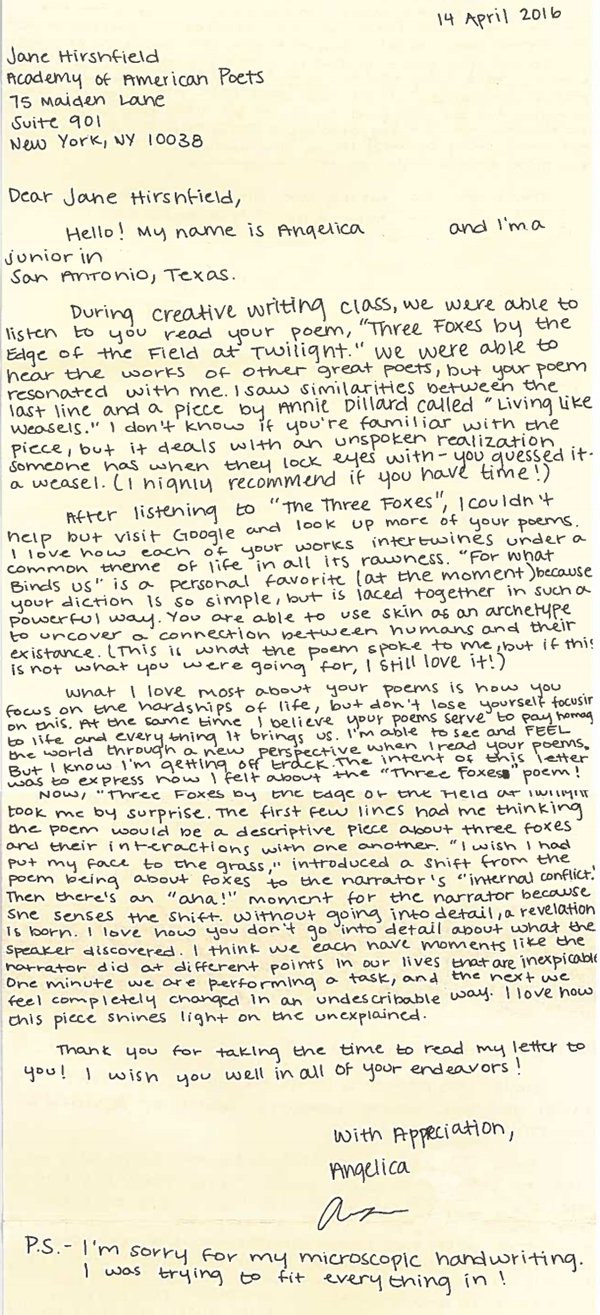
Dear Jane Hirshfield,
Hello! My name is Angelica and I’m a Junior in San Antonio, Texas.
During creative writing class, we were able to listen to you read your poem, “Three Foxes by the Edge of the Field at Twilight.” We were able to hear the works of other great poets, but your poem resonated with me. I saw similarities between the last line and a piece by Annie Dillard called “Living Like Weasels.” I don’t know if you’re familiar with the piece, but it deals with an unspoken realization someone has when they lock eyes with—you guessed it—a weasel. (I highly recommend it if you have time!)
After listening to “Three Foxes,” I couldn’t help but visit Google and look up more of your poems. I love how each of your works intertwines under a common theme of life in all its rawness. “For What Binds Us” is a personal favorite (at the moment) because your diction is so simple, but is laced together in such a powerful way. You are able to use skin as an archetype to uncover a connection between humans and their existence. (This is what the poem spoke to me, but if this is not what you were going for, I still love it!)
What I love most about your poems is how you focus on the hardships of life, but don’t lose yourself focusing on this. At the same time I believe your poems serve to pay homage to life and everything it brings u. I’m able to see and FEEL the world through a new perspective when I read your poems. But I know I’m getting off track. The intent of this letter was to express how I felt about the “Three Foxes” poem!
Now, “Three Foxes by the Edge of the Field at Twilight” took me by surprise. The first few lines had me thinking the poem would be a descriptive piece about three foxes and their interactions with one another. “I wish I had put my face to the grass,” introduced a shift from the poem being about foxes to the narrator’s “internal conflict.” Then there’s an “aha!” moment for the narrator because she senses the shift. Without going into detail, a revelation is born. I love how you don’t go into detail about what the speaker discovered. I think we each have moments like the narrator did at different points in our lives that are inexplicable. One minute we are performing a task, and the next we feel completely changed in an indescribable way. I love how this piece shines light on the unexplained.
Thank you for taking the time to read my letter to you! I wish you well in all of your endeavors!
With Appreciation,
Angelica
Grade 11
San Antonio, TX
P.S. I’m sorry for my microscopic handwriting. I was trying to fit everything in!
Dear Angelica,
Thank you so much for your eloquent and warm response both to “Three Foxes by the Edge of the Field at Twilight” and to my other poems—and also for letting me know that you thought of Annie Dillard’s weasel essay after reading my poem. She’s a writer I’ve always found thrilling.
Your way of broadening the conversation by thinking about other poems and other writers is exactly what feels a right approach, in this life of writing and reading. Any individual work is a complete experience in itself, yet is also part of one continuous bolt of fabric, made of all the exchanges we have with one another, and also with the rest of existence. A fox looks back at us and we at it, a weasel, a poem or essay, and we find ourselves inside connection, inside relationship. This feeling of exchange and conversation, in itself, changes a person. We become less solitary, less selfish, less limited, more accountable and compassionate, any time our intimacy with others increases.
I think you’ve seen and described beautifully some of the core concerns of my work. I also was glad to hear you talk about new perspectives and surprise. These are things I also turn to poems for—I read them and write them to see and feel differently, to discover. Not every poem perhaps, but many I love, could be described as something like a chemistry experiment—a work of art adds one word, color, gesture to another, precisely, attentively, and we discover what happens inside us, in our hearts, our minds, our eyes, our states of being. I do feel that every truly thrilling poem a person reads leaves her or him changed in ways only art is able to do. And after, we will act differently in our lives and in the world.
I also love that you’re happy to find in a poem some things left unexplained. I sometimes think of poems as the way we deal with the part of life’s mathematics that doesn’t work out neatly. There are insoluble events (those hardships you wrote of), and there are thoughts that can’t be spoken directly. Poems find, for me, a way to speak to and toward the elusive, a way we can know our lives more fully without wringing them dry of their complexity, mystery, perfume.
The unexplained and the mysterious aren’t always comfortable, but they are the entrance into a larger existence. A good poem can hold meaning the way a soap bubble holds a rainbow of light. There’s an experience of light you couldn’t have with any other way of looking— one that feels to me tender, infinite, and lasting even when also gone in an instant.
With all warm wishes,
Jane
